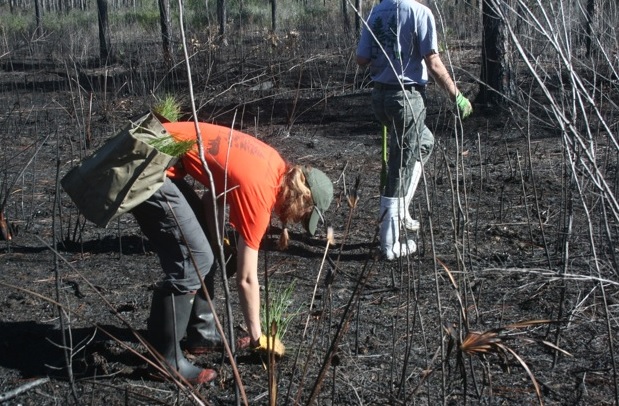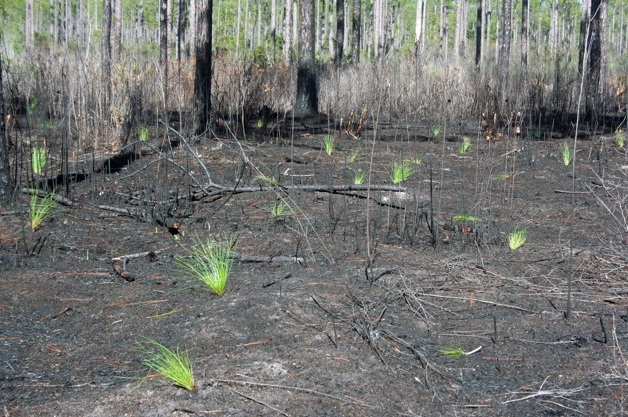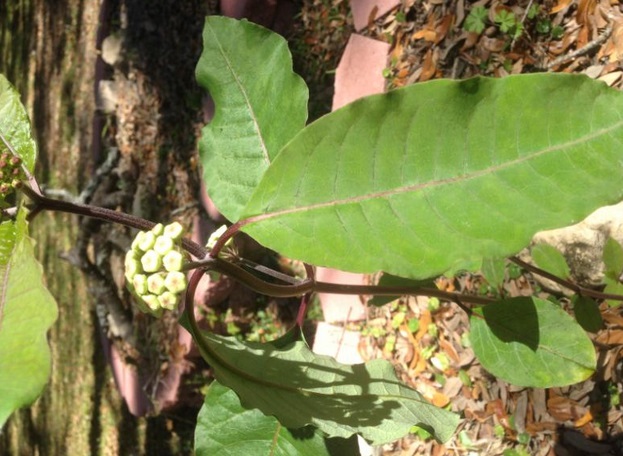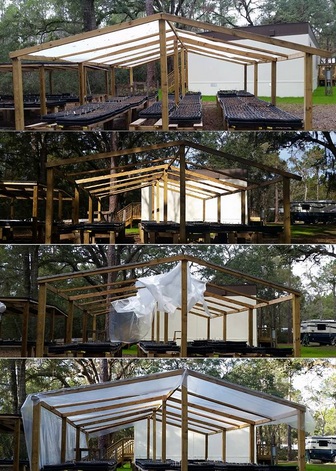
March, 2017 NEWSLETTER FOR FRIENDS OF ST. MARKS WILDLIFE REFUGE
|
Reflections newsletter is a benefit of membership for Friends of St. Marks Wildlife Refuge. It also serves as an important supplement to
the
Friends' web site,
www.stmarksrefuge.org.
Both the newsletter and the web site provide members and the public information about volunteer activities and events at the Refuge.
|
|
|
|
Celebrating 30 Years of Support
for the Refuge
This year marks the 30th year that the Friends have been providing support for the St. Marks National Wildlife Refuge. Throughout all of these years, many hours of volunteer service have been given building, planting, digging, teaching, training, greeting, and giving in so many ways. The Friends have been happy to help all this time in an effort to make our mission that of the Refuge mission.
As you read through this issue of Reflections, and issues yet to be developed, you will see and read more about continued support as we move forward in time; it is what we do. It is what friends
are for.
|
|
|
|
|
The Whole Story
Many people contribute in many different ways to make even modest accomplishments on the refuge happen. That point struck me recently while learning about a 100-acre longleaf pine restoration project north of Port Leon.
Refuge friend Bud Bailey covered part of the cost of restoring this plot, and the Treasurer of the Refuge's Friends group managed these funds. Refuge biologists planned the restoration, and a forester from Lower Suwanee NWR carried out herbicide treatment, as needed.
 Our Refuge fire crew then conducted a prescribed burn to clean up the plot and remove undesirable plants. Soon afterward refuge biologists organized the planting of 23,000 longleaf pine seedlings, and Matt Johnstone, one of our RV volunteers, picked them up from a grower in Madison. Then a youth service group from Apalachicola (Conservation Corps of the Forgotten Coast) led the planting effort, assisted by others, including our newest Carney wildlife conservation interns, Chloe Moore and Brynn Huzzen
 (see picture). Refuge friends Ed and Hilda Carney funded these two Carney Wildlife Conservation interns, and the Refuge Friends group Treasurer managed these funds too.
So now we have some 23,000 seedlings growing in a 100-acre plot that later this Century should be respectable longleaf pine trees. Additional prescribed burns will be conducted during intervening years to help shape the longleaf pine/wiregrass community that belongs here. Few of the people involved in this project will likely be alive when this community is mature. So why, you might ask, are so many people investing their time and money in this project?
A fundamental value held by the kind of people behind this project, and many others like it, is conservation. We love both the environment, and our grandchildren who will inherit it. That requires carefully managing all of our natural resources, which means thinking ahead and planning ahead. Appropriate here is a well known proverb: The best day to plant a tree was 20 years ago. The second best time is now.
Want to help? Conservation is an act of love done in consideration of subsequent generations. So, love our grandchildren and support our Refuge's longleaf pine restoration projects and other conservation efforts, today.
Read more about the
Longleaf Pine initiative by going to the Friends' web site.
Article and Photos courtesy Paul Hamilton.
|
|
You Won't Want to Miss the
2017 Friends' Annual Meeting
We have a great afternoon planned for members of the Friends' group. The Annual Meeting will be led by Mary Smallwood, President of the Friends' Board of Directors. As always, accomplishments made by the Friends' group will be reviewed, plans for the upcoming year will be discussed, and friends will have the opportunity to connect with each other and the Refuge once again. You won't want to miss the April 29 Annual Meeting. Food and refreshments will be provided.

Graphic Credit Courtesy Rita LeBlanc
|
Wakulla Chamber of Commerce
Provided Lighthouse Tour

Twelve members of the Wakulla Chamber of Commerce toured the St. Marks Lighthouse on Friday, March 3. Besides learning more about the history of the lighthouse, business leaders were able to see, first-hand, the current state of deterioration and hear about plans to create a first-class museum at the lighthouse Keepers' House. Several members climbed to the restored lantern room to enjoy the spectacular views.
A restored lighthouse will be a significant economic benefit for Wakulla County due to increased lighthouse tourism.
Above - Ralph Thomas, Chairman of the Wakulla County Commission, and Petra Shuff, Administrator for the Wakulla Chamber of Commerce. Photo and article courtesy Tom Baird, Friends' Board of Directors Vice-President
|
Interns Really Make a Difference at the Refuge
Ask any member of the Friends' board or active volunteer to comment about our interns, and a smile will always accompany a response. That is because the Friends' group proudly provides funding to sponsor internships in wildlife conservation, milkweed propagation, and environmental education. Without interns much of the critical work involved in the wildlife conservation and outreach at St. Marks NWR would not occur. Refuge Manager Terry Peacock beams when she discusses our interns. "
The interns provided by the Friends of St. Marks have assisted us in gathering biological information that we have needed for several years. They are greatly advancing our knowledge of the plants and animals using this refuge," she said.
Carney wildlife conservation interns, supported by a generous donation from Dr. Ed and Hilda Carney, support Refuge biologists in so many ways. They assist in the reintroduction of red-cockaded woodpeckers into the St. Marks Unit; survey habitat and work with critically endangered frosted flatwood salamanders; and identify and map invasive plant species. Refuge Biologist Joe Reinman said, "The Carney Internships have been the biggest boost to the Refuge's biological program in my 36 years at St. Marks."
Aside from the attention to animal communities, plant life is not ignored by any means. The Milkweed Initiative Intern helps Refuge staff document, propagate and promote local ecotypes of native milkweed species to support Monarch butterflies.
Part of the intern's work is devoted to research and preparation for the "Milkweed Practitioner's Guide for the Southeast U.S" which is certain to be an invaluable tool for scientists and others who wish to save the Monarch butterfly. Dedication to the Milkweed initiative by interns and others also ensures that the number of Monarchs seen each year at the Monarch Festival will continue to grow.
New in 2017 is an intern for Environmental Education that will increase outreach to students and others of the Refuge's environmental education programs. The new intern has already taught classes and participated in "science night" at local schools; assisted with Project Learning Tree workshops; and managed a booth at the FSU Mag Lab open house. Given the great diversity of animal and plant life seen at the Refuge, this new interpretative use of internships is invaluable to the public.
Importantly, all the interns gain valuable on-site knowledge and experience that they can carry forward as they pursue their life professions. The Friends are thrilled to play a part in the preparation of these future environmental stewards.
Article courtesy Melissa Jacoby, Secretary, Friends' Board of Directors
|
The Monarch-Milkweed Initiative was launched during the spring of 2015, making 2017 the third year the milkweed nursery and greenhouses have
 been up and running. We have grown so much.
Late last year, Hurricane Hermine damaged nursery infrastructure that had to be addressed this spring. The result is that we now have three greenhouses for use during the different stages of growth of our milkweeds: first for seedling/germination and climate control; second for juveniles, with a plastic roof for moisture control; and the third is for mature plants with screens for UV reduction. Many of our tables have
 had a third leg added to support more weight. An irrigation system is also in early developmental phases.
Aside from upgrading our infrastructure, our winter focus has been on transplanting last year's seedlings into larger pots. Approximately 1,000 seedlings of various species of milkweeds have been transplanted into larger pots for this season.
As springtime rolls in, the milkweeds are emerging from their winter dormancy, and volunteer work days will begin again soon. Our next upcoming work day is scheduled for the morning of March 25th, before the refuge volunteer recognition luncheon. Like us on Facebook to stay updated - Monarch-Milkweed Initiative at
St. Marks NWR.
Article Credit; Nicole Zampieri, Friends Board of Directors.
Caption and credit: Top photo;
We have one Redring Milkweed (Asclepias variegata) that is already about to flower! Photo by Nicole Zampieri.
Caption and credit: Photo above right;
New plastic covering for Greenhouse 2, photo credit, Refuge volunteer
|
Refuge News
Saturday, March 18 - St. Marks National Wildlife Photography Day
Join the St. Marks NWR Photo Club for a special day of photography. Bring your camera or cell phone and a picnic lunch for a fun-filled day of photography and enjoying nature. Behind the gate tram tours at 9 a.m., 10 a.m., 11 a.m., 1:00 p.m. and 2:00 p.m. Beginner's photo class at 9:30 a.m. Digital photography by Shutterbugs at Headquarters Pond Observation Tower. Reservations are required for tours.
Call (850) 925-6121 to reserve a spot.
Sunday, March 19 - E-Tram Tour - 1 p.m.
Tour will be led by volunteer and photo club member Neil Hostnick. Limited to 10 participants. Reservations are required.
Call (850) 925-6121.
|
|
|
|
|
|
Have you considered including the Refuge in your will? We would appreciate hearing from you if so. The Friends of St. Marks Wildlife Refuge can provide information and guide you through the process. Just call the Refuge at 850-925-6121, and ask to be contacted by the Friends' Development Committee,
or email us.
|
|
|
|
|
Reflections Editor, Phillip M. Pollock
|
|
|
|
|